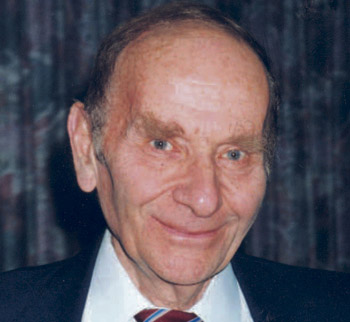WINDSOR — Canada’s hate crime laws may infringe on absolute freedom of speech, but they’re no different from a range of laws that restrict freedom in some fashion, according to Mark Sandler, chair of the board of the Law Foundation of Ontario.
Sandler, a former chair and legal counsel of the B’nai Brith League for Human Rights, was debating Alan Borovoy, former general counsel of the Canadian Civil Liberties Association, in a Feb. 21 debate on hate crimes and Holocaust denial, at a public forum sponsored by Assumption University.
“Even the most fervent civil libertarians… do not advocate for the absoluteness of freedom of speech,” Sandler said. “We recognize, for example, that it’s a criminal mischief, to use the most trite example ever given, to yell fire without cause in a crowded theatre.”
He said Canadian law also obviously provides sanctions against threats of bodily harm or death.
Sandler said libel and slander laws are other examples of laws that “curtail speech.”
But he said that when it comes to the particular law regarding the wilful promotion of hatred against specific racial or religious groups, the issue is more complex, though ultimately valid.
Referring to the Supreme Court of Canada’s definition of hatred arising from the 1990 case against Alberta teacher James Keegstra, Sandler said that “we cannot look at freedom of expression as if it is the only value, the only Charter guarantee, that exists.”
Other guarantees include Section 15’s “equality” clause that protects vulnerable groups. He said it’s “not merely the impact that hate propaganda could have on the community at large, but the impact it has, regardless of whether it increases the number of adherents, on those who are targeted by the hate.”
And Section 27 promotes multiculturalism. “We interpret all of our freedoms, including freedom of speech, having regard to the need to promote and preserve our multicultural heritage,” Sandler said.
But even these parameters aren’t sufficient to bring hate speech prosecutions.
Sandler said there must be ”willfulness” as opposed to speech merely having “an effect,” and someone must be an “instigator” and do so in the public realm against identifiable groups. As well, prosecutions must be approved by the attorney general, which is extremely rare.
“What a hill the prosecution has to climb before speech can be the subject of criminal prosecution,” he said.
As well, Sandler said there are a series of defences, such as the truth of statements or relevance “to any subject of public interest the discussion of which is for the public benefit.
“We’re not going to prosecute marginal conduct. We’re not going to prosecute in the gray areas,” he added.
But Borovoy said the “registering of a conviction is not the only way to judge these things.”
He said he was concerned “by the prosecution that is initially threatened. You don’t enjoy a viable free speech if you have to look over your shoulder worried that you’re going to be charged or harassed for engaging in legitimate speech.”
Borovoy acknowledged the various legal safeguards. But he asked “what happens to all those people in the real world who get harassed?”
He also said that despite supposedly clear definitions of hatred, “the human rights tribunals and courts out West were all over the map as to what hatred means,” he said.
Borovoy would only limit free speech in extremely rare circumstances, such as a speech during the Rwandan genocide calling for the extermination of an opposing tribe.
“I’m not suggesting that the arguments I made to you could necessarily hold for all time and all places,” he said. “I’m arguing that in Canada today this legislation is over the top and constitutes a number of threats that we ought not to incur.”
